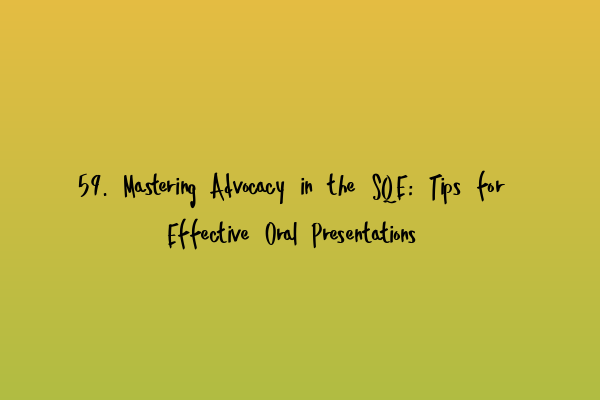59. Mastering Advocacy in the SQE: Tips for Effective Oral Presentations
Welcome to another installment of our SQE Exam Law series! In this blog post, we will explore the art of advocacy and provide you with valuable tips on how to master oral presentations in the Solicitors Qualifying Examination (SQE). Effective advocacy skills are essential for aspiring solicitors, as they play a crucial role in representing clients and presenting arguments in a persuasive manner. So, let’s dive in and discover how you can become a formidable advocate in the SQE!
The Importance of Advocacy in the SQE
Advocacy is an integral part of a solicitor’s role, and the SQE assesses candidates on their ability to effectively communicate and present their case. The oral presentations section of the SQE tests your oral advocacy skills, as you will be required to present legal arguments, engage with clients or witnesses, and address issues in a clear and convincing manner. This segment not only evaluates your legal knowledge but also examines your ability to deliver impactful and persuasive speeches. Therefore, mastering advocacy is crucial for success in the SQE.
Tips for Effective Oral Presentations
Now that we understand the significance of advocacy in the SQE, let’s delve into some practical tips that can help you excel in this component of the examination:
1. Know Your Audience and Purpose
Before delivering an oral presentation, it’s essential to identify your audience and determine your purpose. Consider who you are presenting to and adapt your style and approach accordingly. Tailoring your argument to suit the needs and expectations of your audience will significantly enhance your chances of engagement and success.
2. Structure Your Presentation
A well-structured presentation is key to conveying your argument effectively. Start with a clear introduction to grab your audience’s attention and establish the purpose of your presentation. Then, organize your points in a logical manner, ensuring a smooth flow of ideas. Finally, conclude your presentation by summarizing the key points and reinforcing your main argument.
3. Practice Your Delivery
Practice makes perfect, and this holds true for oral presentations as well. Rehearse your speech multiple times to familiarize yourself with the content, timing and delivery. Pay attention to your tone, pace, and body language, ensuring that they align with the message you want to convey. Practicing in front of a mirror or recording yourself can help identify areas for improvement.
4. Use Engaging Visual Aids
Visual aids can significantly enhance the impact of your oral presentation. Incorporate relevant charts, graphs, or images to support your arguments and make complex information more accessible to your audience. However, ensure that your visual aids are clear, concise, and do not overshadow your spoken words.
5. Develop Strong Listening Skills
Advocacy is not just about speaking; it also involves active listening. During the SQE, you may have to interact with clients or witnesses, so developing strong listening skills is crucial. Pay close attention to what is being said, maintain eye contact, and ask relevant questions. Active listening demonstrates empathy, understanding, and professionalism.
6. Project Confidence and Professionalism
The way you present yourself plays a significant role in building credibility and persuasiveness. Project confidence and professionalism through your body language, tone of voice, and choice of words. Maintain eye contact, speak clearly and assertively, and dress appropriately for the occasion. These elements contribute to a positive impression on your audience.
Boost Your SQE Advocacy Skills Today!
Enhancing your advocacy skills is an ongoing process that requires dedication and practice. By following the tips outlined above, you can significantly improve your oral presentation skills and become a master advocate in the SQE.
For further guidance and preparation strategies for the SQE, make sure to check out the following related articles:
- Strategies to Tackle SQE MCQs: Mastering Multiple-Choice Questions
- Scenario-Based Questions in SQE2: Become a Master Problem-Solver
- Demystifying the SQE Exam Pattern: Knowing What to Expect
- SQE Strategies: Proven Tactics to Ace the Solicitors Qualifying Examination
- SQE Case Studies: Applying Knowledge in Real-Life Scenarios
Remember, effective advocacy is an invaluable skill that will not only help you succeed in the SQE but also in your future legal career. So, start practicing, refining your technique, and become a compelling advocate today!
